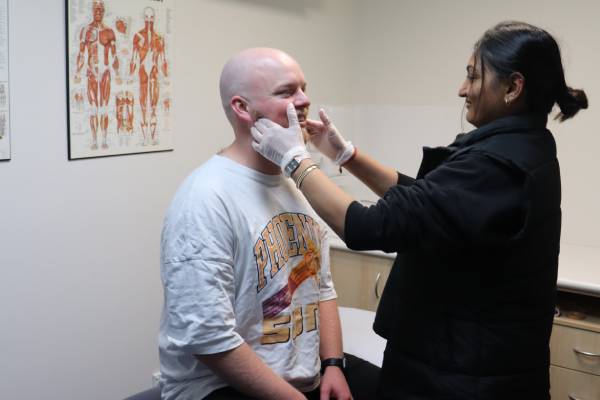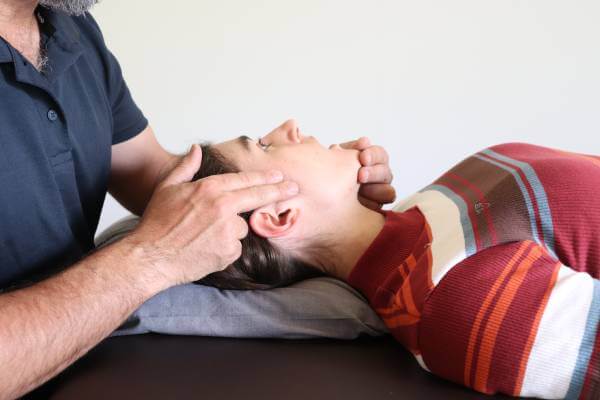TMJ Physio Adelaide
Core Physio & Pilates offers tailored care for TMJ, focusing on improving jaw mobility, reducing symptoms, and promoting a better quality of life.
Managing TMJ Dysfunction at Core Physio & Pilates
Temporomandibular joint (TMJ) dysfunction can impact day-to-day life, affecting how you speak, chew, and even contributing to symptoms like ear discomfort, headaches, and jaw tension. At Core Physio & Pilates, we approach TMJ management with a focus on personalised assessment and treatment, helping clients improve mobility, reduce symptoms, and enhance overall quality of life.


Understanding TMJ Dysfunction
Jaw and facial tension
Difficulty with chewing and speaking
Ear-related symptoms
Headaches originating from jaw strain
Comprehensive TMJ Assessment


Individualised TMJ Management Techniques
Manual Therapy
Gentle, hands-on techniques designed to enhance jaw mobility and reduce muscle tightness around the TMJ.
Jaw Exercises
Targeted exercises that work on jaw muscles to support improved function and joint movement.
Heat and Cold Applications
Localised heat or cold therapy may be recommended to ease inflammation and discomfort.
Lifestyle Recommendations
Guidance on strategies to reduce strain, including adjustments in habits like teeth grinding and jaw clenching.
Conditions That TMJ Physiotherapy Can Help With


Locations We Offer TMJ Physiotherapy
TMJ Physio Resources
Jaw (TMJ) pain is a common problem that can be treated by a physiotherapist. Luke, a physiotherapist from our Burnside […]
FAQ's for TMJ Physiotherapy
What is TMJ disorder?
TMJ (temporomandibular joint) disorder refers to pain or dysfunction in the jaw joint and surrounding muscles. Symptoms often include jaw pain, clicking or popping, difficulty chewing, headaches, or locking of the jaw.
What causes TMJ disorders?
Common causes include; Teeth grinding or clenching (bruxism), Poor posture (especially neck/shoulder alignment), Stress and tension in the jaw muscles, Injury or trauma to the jaw and Arthritis or joint degeneration. Physiotherapy treatments targets these contributing factors to provide long-term relief.
What are the symptoms of TMJ dysfunction?
Symptoms often include jaw pain, reduced movement or opening, misalignment of the jaw and poor closing, clicking or popping, difficulty chewing, headaches, or locking of the jaw.
How can physiotherapy help with TMJ pain?
Physiotherapists provide effective, non-invasive treatment for TMJ disorders. Therapy may include jaw mobility exercises, muscle release, dry needling, posture correction, relaxation techniques, and education to reduce pain and improve jaw function.
Do I need surgery for TMJ disorder?
It is very rare to need surgery for TMJ dysfunction and conservative treatment with a Physiotherapist is usually effective enough to return people to normal function and life.
How long does it take to see results from physiotherapy?
Many patients notice improvement in 2–4 sessions, depending on the severity of their symptoms. Ongoing management strategies may be recommended to prevent flare-ups.
Is jaw clicking always a sign of TMJ disorder?
Jaw clicking is usually a sign that the disc within the TMJ is not functioning correctly to allow free and normal movement. In the early stages of TMJ dysfunction this may be something this is rectifiable with targeted Physiotherapy care. Having a concise physiotherapy assessment will determine the strategies necessary to to change this and help highlight an appropriate treatment plan.
Can stress make TMJ symptoms worse?
Yes. Stress often leads to clenching or grinding, which places strain on the jaw muscles and joints. Physiotherapy includes strategies to manage tension and reduce stress-related jaw pain.
Do I need a referral to see a physiotherapist for TMJ?
In most cases, no referral is needed to see a physiotherapist for TMJ. However, if you are claiming through Medicare, DVA, NDIS, or private health, your GP or dentist may provide one.
What should I expect at my first TMJ appointment?
Your physiotherapist will assess your jaw, neck, posture, and muscle tension. Treatment may include joint mobilisation techniques, specific myofascial release techniques, relaxation techniques, jaw exercises, and advice on habits such as clenching or posture to reduce strain.
Book an Appointment
Book an appointment with our friendly team of Adelaide physiotherapists today and take the first step towards better health and wellbeing. We offer flexible scheduling to accommodate to you.
